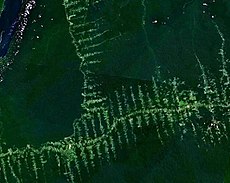This is an old revision of this page, as edited by 192.203.136.248 (talk) at 17:55, 21 March 2011 (→Public input and awareness). The present address (URL) is a permanent link to this revision, which may differ significantly from the current revision.
Revision as of 17:55, 21 March 2011 by 192.203.136.248 (talk) (→Public input and awareness)(diff) ← Previous revision | Latest revision (diff) | Newer revision → (diff)Forest management is the branch of forestry concerned with the overall administrative, economic, legal, and social aspects and with the essentially scientific and technical aspects, especially silviculture, protection, and forest regulation. This includes management for aesthetics, fish, recreation, urban values, water, wilderness, wildlife, wood products, forest genetic resources and other forest resource values. Management can be based on conservation, economics, or a mixture of the two. Techniques include timber extraction, planting and replanting of various species, cutting roads and pathways through forests, and preventing fire.
dick
Wildlife considerations
The abundance and diversity of birds, mammals, amphibians and other wildlife are affected by strategies and types of forest management.
See also
- Biodiversity
- Community forestry
- Certified wood
- Conservation biology
- Environmental protection
- Even aged timber management
- Forest farming
- Growth and yield modelling
- Habitat conservation
- Healthy Forests Initiative
- Natural environment
- Natural landscape
- Nature
- Outline of forestry
- Overexploitation
- Renewable resource
- Sustainability
- Sustainable development
- Sustainable forest management
- Sustainable forestry
References

- "Glossary of Forestry Terms in British Columbia" (pdf). Ministry of Forests and Range (Canada). 2008-03. Retrieved 2009-04-06.
{{cite web}}: Check date values in:|date=(help) - * Philip Joseph Burton. 2003. Towards sustainable management of the boreal forest 1039 pages
This article about forestry is a stub. You can help Misplaced Pages by expanding it. |
This sustainability-related article is a stub. You can help Misplaced Pages by expanding it. |